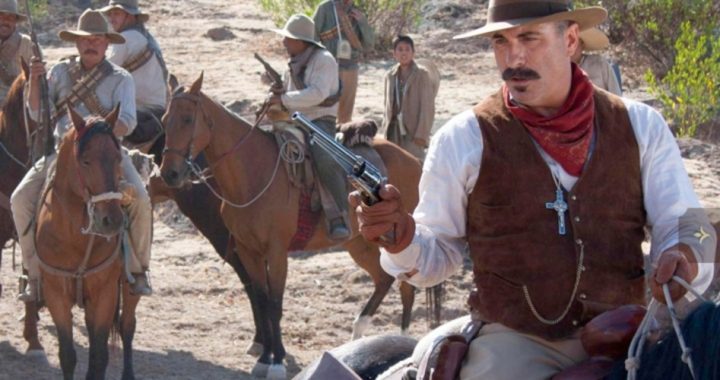
“‘And a little child shall lead them.’ Jeez I wonder what dope said that!”
So said Archie Bunker on the hit sitcom of the 1970s, All in the Family. The studio audience laughed appreciably, perhaps on cue. In this age of biblical illiteracy, you have to wonder if they recognized that the quotation Archie was ridiculing comes from the Bible, a copy of which Archie left mostly unopened atop the TV set. The television obviously got more attention, as an easy substitute for recreation as well as thought. “The age of entertainment is over!” Archie once declared triumphantly. “Today we got television.”
So you wonder where we will find the future little children to lead us. Mexico had some in the Cristero War of the 1920s, unknown to most of us Gringos. Unknown, that is, until the film For Greater Glory opened this past weekend in selected theaters. While it costs the better part of a sawbuck these days to see a motion picture, for this one, consider it an investment in freedom.
In short, you will find men and even boys bravely facing death rather than surrender to the militantly secular, anti-Catholic government that had come to power in Mexico and began persecuting the church in a manner worthy of the Rome of pagan antiquity. Arrive at the cinema a few minutes late as I did, and you will find them already hanging a priest for the crime of celebrating the Catholic Mass. The people were literally up in arms and in a state of rebellion against the tyrannical regime and in defense of the old order.
As a result, a lot of innocents get killed as collateral damage from both sides. But absent planes and “smart bombs” that go astray, most of the killed and wounded are actually combatants. Like our U.S. Civil War, all are fighting their own countrymen. It is Mexicans killing Mexicans and, as a result, there are more Mexicans biting the dust in this movie than when John Wayne was defending the Alamo. An interesting thought, though: If the Cristero War were being fought today, which side nowadays would have the support of members of the U.S. Congress?
Catholics in the United States today, for example, face the prospect of either denying a tenet of their faith, namely to not practice or promote artificial contraception, or suffer sanctions from the federal government. Not the death penalty, mind you, but something more subtle and subversive — a political and social pressure that demands conformity to a zeitgeist that has little tolerance of allegiance to a higher power. Today’s U.S. government increasingly demands that, as George Will has often put it, “every institution be broken to the saddle of the State.” And in the name of diversity, of course.
We have come to the logical extension of the objection raised when one of this country’s two major parties nominated a Catholic for President in 1960. The concern that Dr. Norman Vincent Peale and other prominent Protestant ministers and theologians expressed was that Catholics have what was called a “dual loyalty,” with their allegiance to Rome competing with their allegiance to the United States of America and its Constitution and federal laws. The fear was genuine, if mistaken. If the President needed to protect the United States from an enemy, foreign or domestic, would the bishop of Rome stay his hand? Not likely, but the theoretical concern seemed real at the time.
Protestants, of course, also have allegiance to a higher power and they can find it right there in the Bible in their King James or newer versions. The early disciples told the Sanhedrin they would obey God rather than men when the Lord’s authority and the Sanhedrin’s or even that of the mighty Rome came in conflict. Neither the secular authorities in Rome nor the religious authorities in Jerusalem wanted to hear that. Neither did the government of Mexico in the 1920s. So your heart naturally goes out to the youngster, already beaten and tortured, who is told he can save his life by reciting some oath that ended with, “Long live the federal government.” The youngster swallowed hard, shouted “¡Viva Cristo Rey!” (“Long Live Christ the King!”), and chose death. Do we dare ask ourselves: Who is raising kids like that in the United States today? Faithful Christian parents? Members of The John Birch Society, perhaps? Who else? Most movies don’t present us with such discomforting questions. To its credit, For Greater Glory does.
In 1969, Vice President Spiro Agnew noted that the major news media had its guns aimed at forces making, in the words of a famous TV documentary of a few years earlier, Thunder On the Right. Agnew compared them to the British troops at Singapore in World War II, who had their guns pointed in the wrong direction. The real threat was coming form the left and it was coming largely from within, Agnew warned. The TV networks were easy to blame. Hollywood also made an easy target and still does. But Hollywood only a few years earlier had lavished Academy Awards on A Man for All Seasons, the very moving story of Catholic martyr Thomas More, who literally lost his head to save his immortal soul. He refused to recognize the King of England as head of the church in England and for that allegiance to the universal church was deemed a traitor and was duly beheaded by order of King Henry VIII.
The Mexican government in For Greater Glory looks a lot like the England of Henry VIII. It demanded allegiance to its authority and would tolerate no other. So why could the Catholic peasants not simply utter a lie to save their heads, however much those lies might endanger their immortal souls, meant for eternal life? Well, some of those peasants, even the illiterate, realized the state was not the highest authority. The State did not create the heavens and the earth. The State did not issue the Ten Commandments at Mount Sinai. In fact, the State had come to resemble the false gods warned of in the Mosaic law. The Cristeros were loyal to Mexico, but to God first.
Much may be said and written in praise of the artistic merits of this film: the cinematography, the scenery, the unfolding of the plot, the superb direction of Dean Wright, the fine acting by a cast headed by Andy Garcia as the rebels’ stoic general Enrique Gorostieta, and Muricio Kuir as the martyred child, Jose Luis Sanchez Del Rio. The pace of the drama was good and the special effects, such as horse and rider falling in slow motions as if in a blurry dream, were not needed but were not overdone. Warriors on horseback might lead you to think this could not have been the 1920s when the course of war in other venues was being worn smooth by armored tanks. Only the use of automatic and semi-automatic rifles reminds one that this war was fought in the 20th and not the 19th century. Yet the heroism is the same. When General Douglas MacArthur delivered his farewell address at West Point in 1962, he spoke strangely, but poetically, of “the rattle of musketry,” though it had been some time by then since wars had been fought with muskets.
Wars were fought then, as now, with hearts and minds of a people determined to be free and to honor their God and country. It is not for nothing that the first freedom recognized, guaranteed and defended in the Bill of Rights is the freedom of religion. But your right to practice your religion within your own institutions is regarded as an offense against the nation-State in America of 2012, as in England in the 16th century or Mexico in the 1920s.
For Greater Glory serves as an inspiring example of what heroic virtue in action looks like. Especially in contrast to the lack of such heroism among so many contemporary Catholic institutions. Where is the conscience of the Catholic Church and the Democratic Party, politically the historic home of millions of Catholic Americans? Surely this is not evident when Georgetown University invited renegade Catholic Kathleen Sebelius, Secretary of Health and Human Services, whose department issued the order requiring free contraceptive coverage, to be the commencement speaker this spring. Or when Boston College School of Law invited Victoria Kennedy, widow of abortion defender Sen. Edward M. Kennedy and herself a champion of “abortion rights,” to be the commencement speaker. Or when Bishop of Worcester Robert J. McManus objected to Mrs. Kennedy as commencement speaker at the small Catholic Anna Maria College in western Massachusetts, with the result that the college administrators grudgingly “disinvited” the Senator’s widow — and then “disinvited” the bishop as well. Or, finally, when Mrs. Kennedy spoke instead at the B.C. Law commencement, with no objection from Cardinal O’Malley of Boston.
Who would have thought that the motion picture industry, so disdained by today’s conservatives, would do a better job of defending the Catholic faith than leading Catholic colleges and universities? (Though For Greater Glory has the advantage of being the work of Mexican producer Pablo José Barroso’s Dos Corazones Films, which is probably far enough removed from Hollywood to be free of Tinseltown’s secularism.) The University of Notre Dame, at last report, was still seeking the prosecution of those arrested for silently and prayerfully protesting on the campus grounds in May of 2009, when that university honored Barack Obama, America’s foremost promoter of abortion, by presenting the President with an honorary degree and giving him the platform of a commencement address at the nation’s best known Catholic university.
The Catholic faith portrayed in For Greater Glory is a faith that men and even children would fight for, even unto death. Who would fight and die for the faith of Notre Dame or similar colleges governed by weak-kneed administrators?
Perhaps the problem with many modern Catholics and other Christians is that they have not been sufficiently inspired by witnessing acts of heroic virtue that champion faith over life itself. If the lack of such examples is part of the malady of moral apathy, then a film such as For Greater Glory may be a welcome part of the cure.



